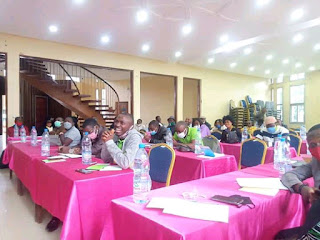Emergence of Veteran Clubs: Coping Mechanisms of People in Bamenda, a Crisis Zone Using Sports
Story, Peter Tasi
In the heart of Bamenda, a town long plagued by the Anglophone crisis in Cameroon, a quiet revolution is taking place not with protest or politics, but with football boots, laughter, and community spirit. On Sunday mornings, while some chose to go to church, stay at home or do other activities, at a dusty field in the Foncha Street neighborhood, located in the Bamenda III Subdivision, men and women from all works of life including teachers, doctors, truck drivers, and retirees gather not only to play football but to reclaim a sense of purpose, belonging, and peace amidst the chaos. They are members of the Foncha Street Veteran Club, and their story is one of hope, healing, and survival through sport.
The Foncha Street Veteran Club, formed in 2005, began as a simple gathering of sport lovers and professionals many of them teachers from GTHS Bamenda, popularly known by many as Canada. Over the years, the group evolved, withstanding the test of time and the tremors of the Anglophone conflict. Many original members, especially francophones, secured transfers out of the region due to the escalating insecurity. Yet, the club endured.
"We’ve faced challenges, especially during ghost towns when members couldn’t travel from town to join us,” said Patrick Fuh Awah, president of the veteran club. “But we kept the spirit alive. Today, our team includes doctors from the regional hospital, teachers, and elders from the neighborhood. We have even seen a resurgence in membership this year, particularly among youths and some aged individuals.”
The club meets every Sunday from 9 a.m. to noon not just to play football, but to support one another emotionally, medically, and socially. The day begins with sports football interspersed with laughter, debates and thereafter, njangi contributions, health talks, and moments of shared joy that members describe as therapeutic.Foncha Street Veteran Club is not just a football club, it is a living community. The club upholds a strong ethos of equality and respect.
"Whether you’re a minister or a truck driver, once you join, you leave your title at the door," said Patrick Fuh. “We are all equal here. Our only distinction is by team color yellow or blue not by profession or status.”
Beyond play, the club serves as a social support system. Members share skills and provide services in-kind. Doctors offer medical advice freely. Technicians help with logistics. Educators assist members’ children in school placements. According to Taniken Jean Awate, a truck driver and long-time member, “Veteran isn’t just about football. When my wife died, this club was there for me. They told me to come back and play. That football helped lift me out of depression.”
For Akosemoh Theodore, coach of the club and a former professional player, the club is a continuation of his love for the game and a chance to give back. “We play for six months in a mini-championship between our yellow and blue teams. At the end, we award medals. It is our way of staying competitive and connected,” he explained.
The Foncha Street Veteran Club’s success is no anomaly. Around the world, sports are increasingly recognized as a powerful tool for healing in crisis zones. The "Sports for Survival" initiative launched during the Syrian Civil War in 2017 provides compelling evidence. Implemented in conflict-stricken communities, the initiative used physical activity to reduce trauma and foster resilience among youth and other group of persons.
The results were profound: 85% reported lower stress and anxiety, 90% experienced improved mental well-being and 75% built stronger community ties.
The initiative has since been scaled and celebrated as a model for using sports to rebuild hope. The story of Foncha Street mirrors this success, albeit informally and at a grassroots level.
Members of the Foncha Street Veteran Club have direct access to healthcare professionals, which is rare in many communities. Dr. Fonka Alain, a dedicated member, emphasized the club’s role in promoting mental health.
“Because of the crisis, people face immense emotional, social, and economic pressure. Every Sunday, we play, laugh, and talk these activities significantly reduce stress. We also hold health talks on behavioral change and lifestyle. It is our contribution to healing the community from the inside out,” he said.
Clinical psychologist Dr. Mbah Irine echoed the sentiment “Exercise is medicine. It boosts sleep, improves self-esteem, and fosters resilience. Veteran groups like these are lifesavers, especially in times like these.”
Despite its many successes, the veteran club model isn’t without challenges. Membership remains voluntary and limited to those who can spare Sunday mornings. The ongoing insecurity in Bamenda still disrupts activities, especially during enforced lockdowns or ghost towns.
“We can’t play when there's a lockdown,” Patrick Afuh admitted. “Also, some still wrongly believe veteran clubs are just drinking groups, which discourages broader community participation.”
Additionally, the informal structure of such clubs means they rely heavily on the goodwill of members rather than institutional or donor support. This makes scaling difficult and sometimes slows down response to members’ urgent needs.
In a city battered by crisis and uncertainty, Foncha Street Veteran Club stands as a testament to resilience. It isn’t just about kicking a ball as many believe it to be, but it is about kicking away stress, loneliness, depression and despair. It's about creating a sanctuary, however modest, where people come not to forget their problems, but to face them together.
As global conflict zones continue to multiply, perhaps the world can learn something from the dusty nature football field in Bamenda. That sometimes, the most effective healing does not come from a hospital or a government, but from ordinary people, choosing every week to come together, play, laugh, and care for one another.
That’s the power of sports. That’s the power of veterans.
This story was reported and written by Peter Tasi in Bamenda, Cameroon.
For inquiries or feedback: tasipeter@gmail.com




Comments
Post a Comment